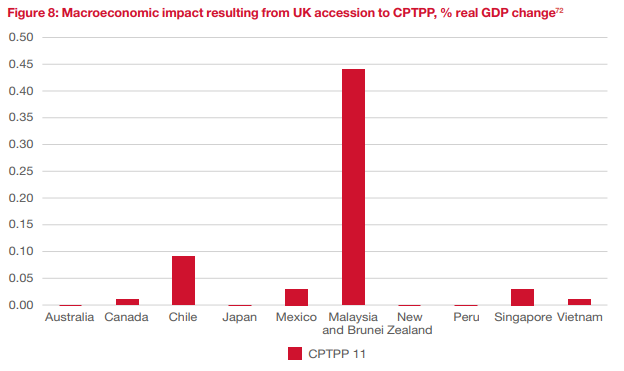
Still economically trivial for the UK to join the CPTPP given we have or will have trade deals with all who have currently ratified, it is biased towards supply chains in, er the Pacific, and expanding the text is unlikely. But mostly harmless as well. gov.uk/government/new…
In global trade terms the likes of Canada, Japan, New Zealand, Chile are likely to have similar views to the UK, though unclear whether the latter, or Malaysia, will in fact ever ratify CPTPP is an issue. There are only 7 active members of CPTPP. fta.miti.gov.my/index.php/page…
There are issues with CPTPP text. Most particularly it includes the controversial Investor State Dispute Settlement, and there is a clash with the European Patent Convention which may cause damage to the UK's patent sector if we withdraw from the latter. committees.parliament.uk/publications/6…
Neither is the CPTPP a particularly advanced trade agreement in areas like services or climate change. That's why some members seek new agreements outside of the CPTPP, such as an agreement on environmental goods. Which the UK doesn't seem to want to join.
https://twitter.com/SamuelMarcLowe/status/1406910083146059779
Of course the biggest issue with the CPTPP is that it assists particularly those companies with trans-Pacific supply chains. The UK is mostly involved in European supply chains. And that's why the economic impact is trivial. It could even be negative.
It should also be added that member countries do not expect to just green light the UK's membership request to join the CPTPP, concerns have been expressed by some of them about our intentions. We're the first, so expect a tough process. But we'll probably join.
In summary then, we'll probably join the Comprehensive and Progressive Trans Pacific Partnership. It will probably do little for the economy as a whole as we already have deals. But politically these are countries we want strong trade relations with.
Trade agreements without an economic and industrial strategy = what exactly? @t0nyyates @TorstenBell
PS in what appears to be a deliberate decision, no headline GDP percentage growth figure is given for UK CPTPP accession. But it appears to be approximately 0.1% from my rough calculations. assets.publishing.service.gov.uk/government/upl… 

If CPTPP grows to include other countries there is a significant GDP boost, though this seems questionably high. No estimate is given for the current active CPTPP membership of 7 countries. Given we have or will trade deals with all, probably not much.
Unfortunately, and this is very sad to see, the Department for International Trade's economic modelling capability is being deemed to produce politically inconvenient results which must therefore be distorted. As a consequence this impact assessment must be treated with care.
Illustration of the limitations of the UK's CPTPP accession. Here is the likely percentage GDP uplift for existing members from the UK joining. Not given for the UK, but.. If UK figures mirror these, Malaysia and Brunei never ratifying CPTPP makes value to UK 0.05% GDP or less. 

Three big issues identified here - ISDS, patents, data. I'd add rules of origin / cumulation, which is much more set up for Japan and Vietnam than the UK, and voluntary standards, where I think there is still a risk to UK participation in European bodies
https://twitter.com/GeorgeMRiddell/status/1407260593728503809?s=20
It would be nice if the UK government engaged seriously on a number of difficult issues related to CPTPP accession, but all previous experience is that this is unlikely to happen at political level, and there's a limit to what officials can do if that happens.
• • •
Missing some Tweet in this thread? You can try to
force a refresh



